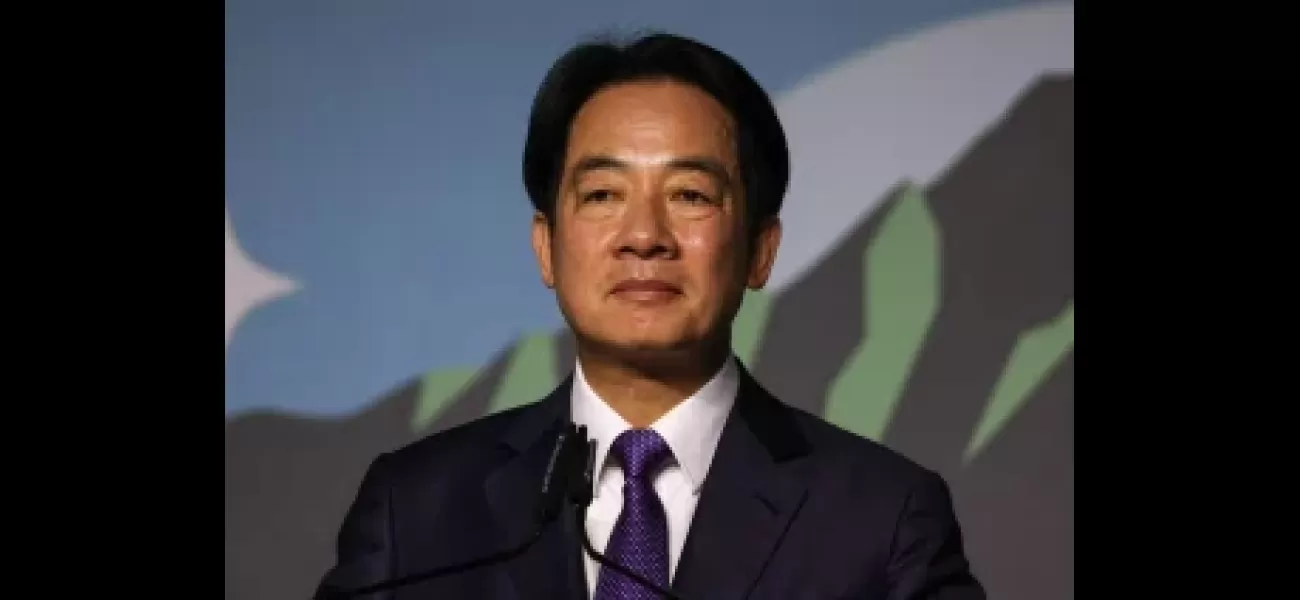A demonstration in Hong Kong where people gathered to form a human chain, protesting for democracy and against police brutality.
New Taiwan president Lai Ching-te faces tensions with China after election win. He vows to defend Taiwan but maintain status quo.
May 27th 2024.

After the recent inauguration of President Lai Ching-te of the Democratic Progressive Party in Taiwan, the country has been experiencing some unsettling developments. President Lai had campaigned on a platform of protecting Taiwan from China's growing influence, but also promised to maintain the current state of affairs between the two nations. This means that he would not openly advocate for Taiwan's independence from China. However, this delicate balance has been threatened by the collaboration of two opposition parties - the Kuomintang and the Taiwan People's Party - who are known for their pro-China stance. Together, they are pushing for a controversial law that could potentially lead to China gaining tighter control over Taiwan, similar to what happened in Hong Kong.
In response to this, thousands of Taiwanese citizens, including young people, have taken to the streets in protest. This demonstration was organized by over 40 groups, many of which were involved in the 2014 Sunflower Movement - a month-long occupation of the Taiwanese legislature in protest against a proposed free trade agreement with China. The current protests have a similar feel to them, as there is widespread anger towards the actions of the Kuomintang. This time, the trigger is a proposed amendment to the law that would allow legislators to summon and question individuals, even if they have access to sensitive information, and punish them if they refuse to answer. This has raised concerns about the misuse of power by the Kuomintang and the Taiwan People's Party to target political opponents or reveal confidential information that could jeopardize national security.
Such measures have been compared to the national security laws implemented in Hong Kong in 2019. Critics fear that these changes could be used by the Kuomintang and the TPP to seize more power and control over the executive branch of government. This is seen as a repeat of past actions by the Kuomintang, such as the wiretapping of a fellow party member who had distanced himself from then-President Ma Ying-jeou. The potential consequences of these developments are alarming, not just for Taiwan but also for the rest of the world.
President Lai has acknowledged the potential dangers and has called for cooperation with China for mutual benefit. However, he has also made it clear that he will continue to work closely with the United States to protect Taiwan from any aggressive actions by China. The situation is tense, and any rash moves by China would have disastrous consequences for the region and beyond.
Overall, the recent events in Taiwan have set the stage for a tumultuous four years, with the Kuomintang and the TPP using their majority in the legislature to pass measures that could undermine President Lai's administration. This is a cause for concern, and the international community must pay attention to ensure that Taiwan's sovereignty and stability are not compromised.
In response to this, thousands of Taiwanese citizens, including young people, have taken to the streets in protest. This demonstration was organized by over 40 groups, many of which were involved in the 2014 Sunflower Movement - a month-long occupation of the Taiwanese legislature in protest against a proposed free trade agreement with China. The current protests have a similar feel to them, as there is widespread anger towards the actions of the Kuomintang. This time, the trigger is a proposed amendment to the law that would allow legislators to summon and question individuals, even if they have access to sensitive information, and punish them if they refuse to answer. This has raised concerns about the misuse of power by the Kuomintang and the Taiwan People's Party to target political opponents or reveal confidential information that could jeopardize national security.
Such measures have been compared to the national security laws implemented in Hong Kong in 2019. Critics fear that these changes could be used by the Kuomintang and the TPP to seize more power and control over the executive branch of government. This is seen as a repeat of past actions by the Kuomintang, such as the wiretapping of a fellow party member who had distanced himself from then-President Ma Ying-jeou. The potential consequences of these developments are alarming, not just for Taiwan but also for the rest of the world.
President Lai has acknowledged the potential dangers and has called for cooperation with China for mutual benefit. However, he has also made it clear that he will continue to work closely with the United States to protect Taiwan from any aggressive actions by China. The situation is tense, and any rash moves by China would have disastrous consequences for the region and beyond.
Overall, the recent events in Taiwan have set the stage for a tumultuous four years, with the Kuomintang and the TPP using their majority in the legislature to pass measures that could undermine President Lai's administration. This is a cause for concern, and the international community must pay attention to ensure that Taiwan's sovereignty and stability are not compromised.
[This article has been trending online recently and has been generated with AI. Your feed is customized.]
[Generative AI is experimental.]
0
0
Submit Comment





